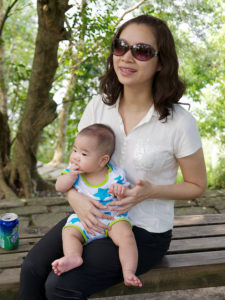Baby Brains and Math- Chanting and Singing
Did you know that babies respond more to the “rhythm” of speech than the words themselves? It is a natural impulse to speak to babies with a higher-pitched-than-normal voice, a sing-song lilting quality to the words, and a repetition that is particular to these interactions. Throughout my career, I have had students and new parents ask me about speaking this way. There are many people who don’t like it and feel like there is something wrong with it. I have heard that this type of speech is discouraged by their families and even ridiculed, calling it “baby talk.”
It isn’t baby talk. Baby talk is when you speak like a baby to other grown-ups, or older children. The above-described speech was traditionally called “motherese” but is now called “infant-directed speech” or “parentese.” Babies’ brains respond positively to this type of speech and their whole bodies respond to chanting and rhythm. If you put an infant on your lap and bounce her to the rhythm of music or a chanted tune, the infant will nod her head, bounce her body up and down, and kick her legs and arms to the beat.
We can use this as a means of supporting mathematical concepts with infants. Through repetitive chanting of songs, infants will begin to internalize number words and concepts. If you sing “The Wheels on the Bus” with an infant in your lap, you can encourage the notion of “round and round” (spatial thinking) and “up and down” (more spatial thinking). If you chant, “This Little Piggy” touching each of baby’s toes one at a time, singing, “this little piggy went to market…” you will encourage “one-to-one correspondence.”

Babies are very fascinating. I believe that infants are influenced by our speech especially if we speak at a certain rhythm. Singing and playing games that involve mimicking encourages one-to-one correspondence.
I am glad to see the distinction between infant directed speech and baby talk. I think it is important for adults to know that babies enjoy and respond to a different pitch and type of language than preschoolers do
Both babies and toddlers seem to enjoy the chanting and hand rhythms with songs. I wonder if there is a correlation between singing and math experience in preschool years?
I never thought of math being in songs! How to know that while they are enjoying the songs they are learning one to one correspondence!
great concept – never thought of it this way. Routines and rhythm really can help with math later in life.
I know from experience that children really like the repetition and rhythm of songs. Because they really like the beat of the songs.
I love how repeating the words in music helps babies how to learn words because it’s repetitive and they will remember it easier.